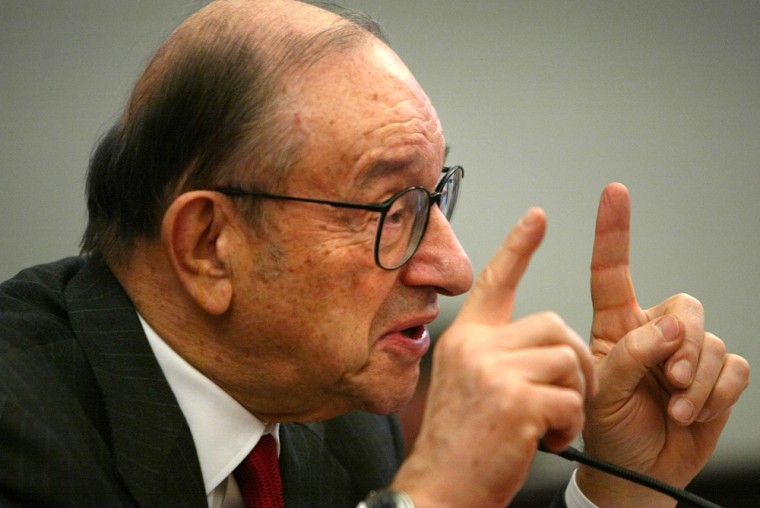Alan Greenspan does not have to worry about re-election, and his reappointment to a fifth term as chairman of the Federal Reserve this year is virtually assured. So he is one of the few Washington policy-makers who can safely touch the fabled “third rail” of American politics and raise the possibility of cutting Social Security benefits.
Greenspan’s comments to a House panel Wednesday sent shock waves through Washington and revived the Social Security problem as a campaign issue at least briefly, although Congress is considered highly unlikely to take any action before this year’s election.
In testimony to the House Budget Committee, Greenspan suggested raising the retirement age and trimming future cost-of-living adjustments to address shortfalls in Social Security revenues that are expected after about 2018.
“The degree of uncertainty about whether future resources will be adequate to meet our current statutory obligations to the coming generations of retirees is daunting,” Greenspan said in his prepared testimony.
Greenspan stressed that the government should meet its existing obligations to people who are already retired or near retirement. But with the first wave of baby boomers reaching retirement age in just four years, and the costs of Medicare obligations projected to soar, Greenspan said “a thorough review of our spending commitments -- and at least some adjustment in those commitments -- is necessary for prudent policy.”
Greenspan’s comments were quickly pounced on by the leading Democratic candidates for president.
“No matter what was said in Washington just this morning, the wrong way to cut the deficit is to cut Social Security benefits,” Sen. John Kerry, D-Mass., said in a speech at the University of Toledo. “If I’m president, we are simply not going to do it.”
North Carolina Sen. John Edwards said it was “an outrage” for Greenspan to suggest extending Bush administration tax cuts while cutting benefits for retirees.
President Bush also responded, saying “benefits should not be changed for people at or near retirement.” He urged Congress to pass his budget proposal, which forecasts a 50 percent decline in the deficit level over five years, although critics have challenged the projections.
Analysts said Greenspan’s comments reflected his growing nervousness about the potential economic impact of rising federal budget deficits, although some found his timing puzzling and questioned the focus on Social Security, which by all accounts is in far better fiscal shape than Medicare.
But Greenspan said demographic trends, including the increasing average U.S. lifespan, mean Congress “will eventually have no choice but to make significant structural adjustments in the major retirement programs.”
Specifically, Greenspan suggested using a new “chain-weighted” inflation index to calculate annual Social Security benefit increases rather than the current Consumer Price Index, which many economists believe overstates consumer inflation. The impact would be to reduce the annual automatic increase in benefits.
At the end of the House hearing, as Greenspan’s proposals were being splashed across the top of news Web sites and over cable television, the Fed chairman denied he was saying anything new.
“I’m not urging Social Security cuts,” he said. Greenspan said he was “merely repeating” some of the same proposals he has been making since he was chairman of a bipartisan commission that recommended significant changes to Social Security in 1983. Many of those changes, including raising the retirement age to 67, were adopted by Congress and credited with putting the system on much sounder financial footing.
Bill Dudley, chief U.S. economist at Goldman Sachs, said he shared Greenspan’s concern about the long-term fiscal problems, although he said Medicare is far more troubling Social Security.
“You can sort of do things at the margin with Social Security,” he said. “Medicare is much more difficult.”
And given Congress’ recent passage of costly prescription drug benefits, Medicare is “going in the wrong direction," he said.
Sung Won Sohn, chief econoimist at Wells Fargo & Co., said Greenspan probably is hoping that Social Security becomes a campaign issue again as it was in 2000, before it was overshadowed by issues of war, national security and the struggling economy.
“There is too much complacency in Washington regarding budget deficits,” Sohn said. “Chairman Greenspan has really been the lone important voice in Washington raising the importance of the issue both short term and long term. … I think he would be pleased if that became a more important discussion issue right now.”
But Gary Burtless, a senior fellow at the Brookings Institution, said he thought it was “a bit disingenuous” for Greenspan to call for scaling back benefits just three years after he endorsed President Bush’s tax cut proposals -- citing budget surpluses that quickly turned into record deficits.
“Social Security is not in any way contributing to the deficit problems of the U.S. government right now, thanks in part to the very constructive role Mr. Greenspan played in 1983,” he said. But he said the idea that we should cut Social Security benefits now is “very strange.”
Dudley said nothing is likely to happen in an election year, although he noted that the sooner Social Security and Medicare problems are addressed, the easier and less painful the solution will be.
“The bad news is it’s very easy to defer these things until you’re in the middle of a crisis.”
